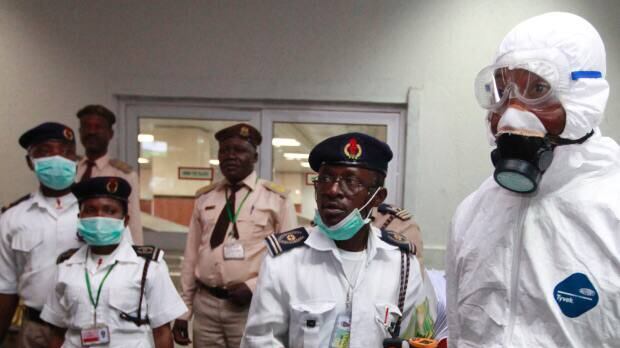Ebola outbreak: How Canada's prep has 'led the world'
Airports, airlines, border agents and hospitals all involved in potential quarantine effort
The Ebola virus continues to claim lives in West Africa, but the risk of it spreading to the Canadian public remains low, health experts say — and even if a case emerged here, the country is well prepared to handle it.
"I'm not concerned. I already know that Canada is prepared," said Jason Tetro, a microbiologist and author of The Germ Code, who recently penned the blog entry Canada, Don't Worry About Ebola in the Huffington Post.
"In truth, we’ve led the world when it comes to being prepared for these types of outbreaks."
- Ebola deaths soar to 887 as Nigeria confirms 2nd case
- 2nd patient arrives in U.S. for more treatment
- Ebola 'cocktail' developed at Canadian and U.S. labs
- The virus: What you need to know to protect yourself
- Canada taking steps to guard against spread of Ebola
The proof, Tetro said, is in how public health officials reacted to an Ebola scare back in March, when a Saskatchewan man returned from Liberia and later became ill.
He was immediately isolated and tested, while anyone he had been in contact with was notified and asked to assess themselves for a 21-day period. (He later tested negative.)
Public health reaction to the case "was exemplary," Tetro said. "We have a fully networked communication process that goes from the airline to Canada Border Services Agency to Public Health Agency of Canada to the individual health care facilities across the country."
Tetro said Canada's readiness can be credited to the SARS Commission, which made a number of recommendations following the outbreak of severe acute respiratory syndrome in Canada in 2003, including asking two key questions of travellers arriving in Canada who may be at risk.
"It’s all based on two big issues: Where did you go, and what are you feeling right now?
"The symptomatology, which was the major thing that people would look at before, is actually secondary now to ‘where were you.' And that’s really the big shift."
Ebola not easily spread
Nearly 900 people have died in the current Ebola outbreak in West Africa. The cases of two American aid workers who contracted the virus in Liberia and were brought to Atlanta for treatment have fuelled concerns about the possibility of Ebola arriving in North America.
But government public health officials have been trying to reassure Canadians they need not worry, reminding people that the virus doesn't spread easily through casual contact or the air, like the flu, and that one can only become infected though direct contact with infected bodily fluids.
In a recent statement, Health Minister Rona Ambrose stressed that all points of entry into Canada are routinely monitored, and travellers showing symptoms are referred to quarantine officers who have the authority to implement public health measures under the Quarantine Act to protect Canadians.
"So if you have travelled to a country where [Ebola] is known to be happening, when you get on a flight to come back to Canada, that flight is flagged and everybody inside is flagged," Tetro said.
"When you arrive, if you have developed symptoms of the flu, they don’t even ask, they put you right into quarantine. There are quarantine officers at every port of entry in to Canada," he said.
Those quarantine officers are "vigilant in their surveillance of travellers who are ill, including those showing signs of nausea, vomiting and diarrhea, or other indications of an infectious disease," Dr. Gregory Taylor, deputy chief public health officer at the Public Health Agency of Canada, said in a recent statement
Airlines and airports must report
Adding to the layers of scrutiny, airlines and airport authorities are required to report ill travellers arriving on international flights to quarantine officers, Taylor said.
Canadian hospitals also have sophisticated infection control systems and procedures in place that are designed to limit the spread of infection and protect health care workers, he added.
As well, health care professionals or other Canadian responders coming back from Ebola-stricken areas in West Africa are being asked to monitor themselves for symptoms for 21 days.
Jay Keystone, senior staff physician at Toronto General Hospital's tropical disease unit, recently told CBC News that Ebola could come to Canada and it's the first responders — the paramedics, emergency room doctors and other physicians — who he's most worried about it.
"Because if someone gets sick and they don't tell them that they've come from one of those areas, and someone doesn't ask, then you've got a problem," he said.
But the virus spreading to the general public is unlikely, he said.
"We have excellent infection control.... We have isolation techniques with negative pressure rooms, excellent mask, gowns, etcetera. So the likelihood that it's going to spread here [is] extremely small. But it could come here."
